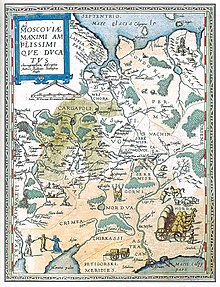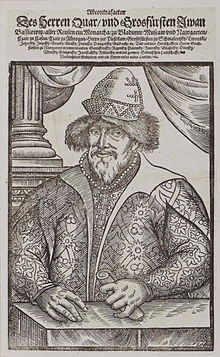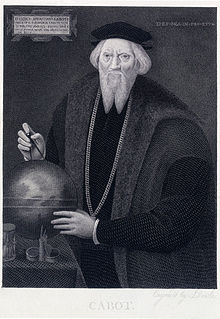Muscovy Company
The Muscovy Company ( Russian Московская компания / Moskowskaja kompanija ; official name since 1566: The Fellowship of English Merchants for Discovery of New Trades also known as Russia Company , Company of Merchants Trading with Russia ) was an English trading company founded in the mid-16th century for trade with Russia .
It was the first English Joint Stock Company ( Aktiengesellschaft ) and was the model for similar undertakings in the following period. The company continued to exist until 1917 despite economic setbacks and, at times, political problems. It has been a charity ever since. In addition to its economic significance as one of the first joint stock companies, the company was of great importance as a motor for exploring northern Europe and Russia.
prehistory
In the middle of the 16th century, especially after Sebastiano Caboto returned to England, there were renewed considerations to look for a northern route to China . The aim was not only to secure a share in the spice trade , but also to look for new sales opportunities for English woolen goods, as trade stalled due to the uncertain political situation, especially in the Netherlands. In the Baltic Sea area , English trade faced competition from the Hanseatic League , while in the Mediterranean and Africa the Spanish, Portuguese and even the Venetians dominated trade. Russian products such as wax, furs and grain came to England from Novgorod through the Hanseatic League . Conversely, English cloth was exported to Russia in this way. There was no significant competition in northern Russia. From there it was believed that they could advance in the direction of India and China. It was precisely this that convinced financiers to invest in such a company.
Foundation phase
The expedition was supported by the Crown and financed by 240 London merchants - including many who belonged to the Merchant Adventurer Society - nobles and high government officials. Shares of £ 25 each were issued. This added up to a capital of £ 6,000.
Hugh Willoughby and Richard Chancellor organized a three-ship expedition in 1553. Beyond the North Cape , Willoughby's ships were lost. The crew stranded and died as a result. Chancellor came with the remaining ship to the area of today's Arkhangelsk at the mouth of the Northern Dvina in the White Sea .
At the invitation of the tsar, Chancellor traveled to his court in Moscow. He succeeded in writing to Edward VI from Tsar Ivan IV . to obtain significant rights for future English trade with Russia. The port at the mouth of the northern Dvina was opened to trade with England. The privileges included freedom from customs duties and permission to trade within Russia. After Antony Jenkinson was allowed to sail the Volga to the Caspian Sea in 1557, the right of transit trade was added in 1569. However, the tsar reserved the right of first refusal. The Russian side had an interest in bypassing Sweden , Lithuania and Livonia on the Baltic Sea in trade with the West. In addition, the tsar was also interested in a political alliance with England. When Elizabeth I later did not respond, the freedom from customs duties was restricted.

After Chancellor's return, the Muscovy Company (also Russia Company) was founded in 1555. Their official name was: marchants adventurers of England, for the discovery of lands, territories, iles, dominions, and seigniories unknowen, and not before that late adventure or enterprise by sea or navigation, commonly frequented . Sebastiano Caboto became governor of the association. The statutes were issued by Maria I and her husband Philip II.
The company is considered the first joint stock company recognized by the English state - a kind of stock corporation. Before that, investors usually got together for a trip. However, the company was designed to last. The new company later became a model for similar start-ups.
The original minimum stake of 25 pounds was increased to 200 pounds in 1564. In 1566 the name was changed to The Fellowship of English Merchants for Discovery of New Trades . At the same time, the parliament sanctioned the privileges of society and extended the area of interest to Armenia and the Caucasus .
The company had agents and a trading post in Russia, the seat was in Moscow until 1717 . The buildings (Old English Yard) have been partially preserved and are located near the Kremlin . Then the seat was moved to Arkhangelsk. From 1723 the trading post was located in St. Petersburg . An Anglican clergyman was stationed there each time .
Upswing
In addition to Willoughby, the navigators Stephen Borough and William Borough were instrumental in establishing a trade route through the White Sea. In 1557 the company began regular trade with Russia by sea. The English exported their woolen goods and bought Russian goods. Russian rope, which was considered to be of high quality, was particularly popular. The Royal Navy alone bought £ 10,000 worth of cordage a year. At the end of the 16th century, around ten ships sailed the White Sea route annually. Since the 1570s, the Dutch competed with the English.
In addition to trading, the company also continued the search for a northern sea route to Asia. In 1556, a company expedition discovered the island of Novaya Zemlya . The assertion of a trade monopoly with Russia became more important than the further search for the Northeast Passage.
The company also tried to open up trade routes through Central Asia via Persia to bypass the Ottomans and Venetians in the Mediterranean. Anthony Jenkinson made a total of seven trips. But he had to break off his trip in 1559 in Bukhara and in 1562 in the Persian Kasvin . The wars between Persia and the Ottoman Empire also prevented the project from being successful. Because it was not possible to trade with Asia via Russia, the Levant Company was founded in 1581 to try to acquire the coveted goods in the eastern Mediterranean.
In addition to the route across the White Sea, another route was set up to Narva in present-day Estonia across the Baltic Sea. This was by no means unrivaled for the English. Hamburg has been trading on the route since 1560 and the Dutch also started trading trips. The company also faced problems from English merchants who did not belong to it and traded with Russia. The company tried to enforce its trade monopoly on this route as well.
Further development

Not least the political situation caused problems for society. Thus, in 1571, a revolt against Ivan the Terrible cost the company 400,000 rubles . There were also pirates in the Caspian Sea and the Baltic Sea. The company tried to get into the field of fishing and whaling , but came into sharp competition with other groups. The attempt in the 1580s to resume trade with Persia also failed. In 1608, the company unsuccessfully hired Henry Hudson to search for the Northeast Passage.
The increase in competition in particular reduced the company's profits around 1600, and in 1609, at least temporarily, its existence as an independently acting stock company was given up. Instead, licenses for trade with Russia were granted for some time.
Around 1620 the company tried again to start trading with Persia. The whaling business also proved difficult because of the decline in whales from 1636 onwards. After the execution of Charles I in 1649, the society lost its privileges in Russia and all English were expelled from the country. Even when trade between the two countries was resumed in 1663, the company did not get its rights back.
It was not until the time of Peter the Great that trade between England and Russia began to gain importance again. The company had survived, but its importance had fallen sharply. Only a few were granted membership. The dissatisfied gathered in the Eastland Company , which, in alliance with a group of tobacco dealers, began to question the Muscovy Company's monopoly. The House of Commons passed a law in 1699 that allowed all Englishmen to join the Company for an entry fee of £ 5. The expansion of the economic base gave the company only a limited upturn. Trade via Russia with Persia was profitable. In the middle of the 18th century this was interrupted by local wars and not resumed. At the end of the 18th century, the company collapsed in its old form.
It continued to exist as a trade organization and in the 19th century had branches in Arkhangelsk, Kronstadt , Moscow and St. Petersburg. Anglican churches were also founded in this context. Since the October Revolution of 1917 the society has been mainly a charity for the benefit of English clergy in Russia.
Individual evidence
- ↑ Peter Wende: The British Empire: History of a world empire. Munich 2008, p. 22.
- ↑ James I. Miklovich: Muscovy Company: Historical Dictionary of the British Empire: KZ. Westport 1996, p. 769; Henryk Zins: England and the Baltic in the Elizabethan Era. Manchester 1972, pp. 35-37, Douglas R. Bisson: The Muscovy Company. In: John A. Wagner, Susan Walters Schmid (Eds.): Encyclopedia of Tudor England. Santa Barbara 2012, p. 778 ( entry on Guildhall Library Manuscripts Section ).
- ^ Henryk Zins: England and the Baltic in the Elizabethan Era. Manchester, 1972 p. 35, Douglas R. Bisson: The Muscovy Company. In: John A. Wagner, Susan Walters Schmid (Ed.): Encyclopedia of Tudor England. Santa Barbara, 2012 p. 778
- ↑ Hans-Joachim Torke: Introduction to the history of Russia. Munich, 1997 p. 74, Douglas R. Bisson: The Muscovy Company. In: John A. Wagner, Susan Walters Schmid (Ed.): Encyclopedia of Tudor England. Santa Barbara, 2012 p. 778
- ↑ The spellings are different. The title here after: Entry on Guildhall Library Manuscripts Section
- ↑ James I. Miklovich: Muscovy Company: Historical Dictionary of the British Empire: KZ. Westport, 1996 p. 769
- ↑ Entry on Guildhall Library Manuscripts Section
- ^ Douglas R. Bisson: The Muscovy Company. In: John A. Wagner, Susan Walters Schmid (Ed.): Encyclopedia of Tudor England. Santa Barbara, 2012 p. 778
- ↑ Reinhard Wendt: From colonialism to globalization: Europe and the world since 1500. Paderborn, 2007 p. 124, James I. Miklovich: Muscovy Company: Historical Dictionary of the British Empire: KZ. Westport, 1996 p. 769, Douglas R. Bisson: The Muscovy Company. In: John A. Wagner, Susan Walters Schmid (Ed.): Encyclopedia of Tudor England. Santa Barbara, 2012 p. 778
- ^ Henryk Zins: England and the Baltic in the Elizabethan Era. Manchester, 1972 p. 41ff.
- ↑ James I. Miklovich: Muscovy Company: Historical Dictionary of the British Empire: KZ. Westport, 1996 p. 770
- ^ Douglas R. Bisson: The Muscovy Company. In: John A. Wagner, Susan Walters Schmid (Ed.): Encyclopedia of Tudor England. Santa Barbara, 2012 p. 778
- ↑ Margrit Schulte Beerbüh: German merchants in London. World trade and naturalization (1660–1800). Munich. 2007 pp. 125f., James I. Miklovich: Muscovy Company: Historical Dictionary of the British Empire: KZ. Westport, 1996 p. 770
- ↑ Margrit Schulte Beerbüh: German merchants in London. World trade and naturalization (1660–1800). Munich. 2007 p. 126f., James I. Miklovich: Muscovy Company: Historical Dictionary of the British Empire: KZ. Westport, 1996 p. 770
- ↑ Entry on Guildhall Library Manuscripts Section
literature
- Peter Wende : The British Empire: History of a World Empire. Munich 2008, p. 22.
- Douglas R. Bisson: The Muscovy Company. In: John A. Wagner, Susan Walters Schmid (Ed.): Encyclopedia of Tudor England. Santa Barbara 2012, p. 778.
- Reinhard Wendt : From colonialism to globalization: Europe and the world since 1500. Paderborn 2007, p. 123f.
- Hans-Joachim Torke: Introduction to the history of Russia. Munich 1997, p. 73f.
- Henryk Zins: England and the Baltic in the Elizabethan Era. Manchester 1972, p. 35ff.
- Margrit Schulte Beerbüh: German merchants in London. World trade and naturalization (1660–1800). Munich 2007, pp. 125–128.
- James I. Miklovich: Muscovy Company: Historical Dictionary of the British Empire: KZ. Westport 1996, pp. 768-771.


